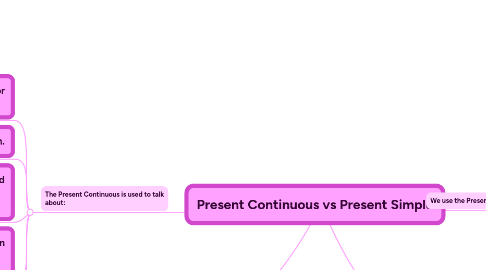
1. The Present Continuous is used to talk about:
1.1. actions that are going on round or at the time of speaking.
1.1.1. I'm waiting fot the train. Jane's taking a bath at the moment.
1.1.1.1. Examples:
1.1.1.1.1. •You are learning English now. •You are not swimming now. •Are you learning English now?
1.2. temporary situation.
1.2.1. He's working in Oxford just now. (but next year he will do somithing else)
1.3. changing situation, especially with verbs like get and become and with comparative adjectives like more, worse, better.
1.3.1. He's getting fat, isn't he? This city is becoming more and more dangerous.
1.4. behaviour that happens more often than expected, with always, forever and constantly.
1.4.1. Why are you always shouting. She's forever buying me presents.
1.5. future plans
1.5.1. I'm meeting Harriert at six o'clock.
2. Form
2.1. am/is/are + present participle
3. We use the Present Simple for
3.1. repeated Actions
3.1.1. We come here every week.
3.1.1.1. • I play tennis. • She does not play tennis. • Does he play tennis?
3.2. a permanent situation
3.2.1. She lives in a small flat in London
3.3. states, things staying the same, facts and things that are true for a time.
3.3.1. We live quite near.
3.3.1.1. • The train leaves tonight at 6 PM. • The bus does not arrive at 11 AM, it arrives at 11 PM.
3.4. thoughts and feelings
3.4.1. I think so, I like it.
3.4.1.1. • Cats like milk. • Birds do not like milk. • Do pigs like milk? • California is in America.
3.5. in a nagative question with why to make a suggestion.
3.5.1. Why don't we go out?
3.6. describing a film scene or telling a joke
3.6.1. She walks into the room, and sees the bottle and two glasses on the table,so she knows...
3.7. "always" means "every time".
3.7.1. I always make silly mistakes in exams.
3.8. the future when we talk about a timetable, usually a public one such as a train timetable.
3.8.1. The train lives at seven twenty-three tomorrow morning.
